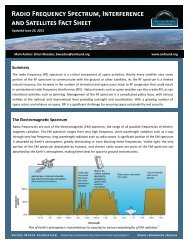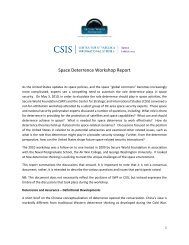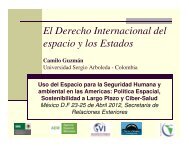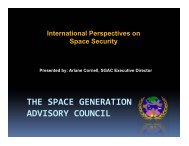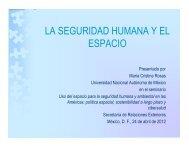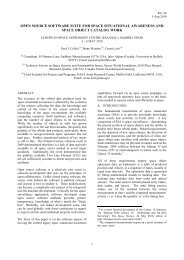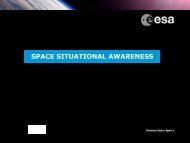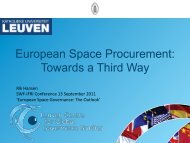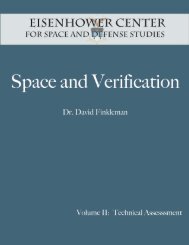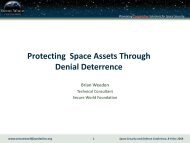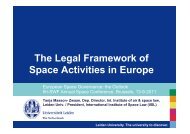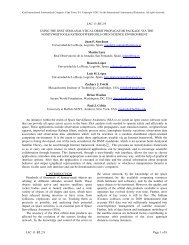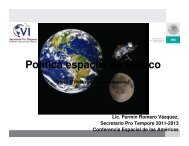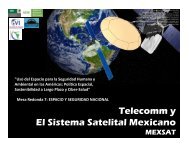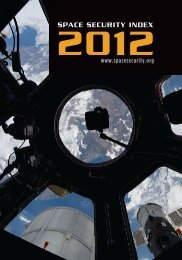Space Security Index
Space Security Index
Space Security Index
You also want an ePaper? Increase the reach of your titles
YUMPU automatically turns print PDFs into web optimized ePapers that Google loves.
<strong>Space</strong> <strong>Security</strong> 2011<br />
68<br />
amongst them on the prioritization of main issues on the CD agenda and attempts of some<br />
countries to link progress in one area to parallel progress in other areas,” 92 thus preventing<br />
any progress on the issue of the Prevention of an Arms Race in Outer <strong>Space</strong> (PAROS). While<br />
the validity of some of Pakistan’s concerns is conceded — many other countries, including<br />
Egypt, Indonesia, Iran, North Korea, Sri Lanka, and Syria have joined Pakistan in seeking<br />
a more “balanced program of work” 93 — commentators say that the country has in fact<br />
backtracked on its commitments to these consensus-based processes, despite its apparent<br />
rm stance that consensus should prevail. 94<br />
Despite continued gridlock over an o cial program of work, the CD did organize four<br />
informal meetings on the PAROS issue in June and July under the coordination of<br />
Ambassador Soares of Brazil. Ambassador Soares provided the Conference with a written<br />
report on these discussions which conveyed the perspectives of members on the possible<br />
negotiation of an international instrument on PAROS. 95 e 2010 session ended in<br />
deadlock, with some countries proposing that FMCT negotiations be moved elsewhere or<br />
that the CD consensus principle be dropped. As long as states cannot agree on how best to<br />
deal with these issues, progress will be stalled, despite proposals to set deadlines for the CD’s<br />
resumption of work. 96<br />
2010 Development<br />
Progress in COPUOS as a working group emerges to take on the long-term sustainability of outer space<br />
activities<br />
While no notable new initiative emerged from the Legal Subcommittee to the Committee on<br />
the Peaceful Uses of Outer <strong>Space</strong>, on 18 and 19 February 2010, the Scienti c and Technical<br />
Subcommittee (STSC)) established a Working Group on the Long-term Sustainability of<br />
Outer <strong>Space</strong> Activities and elected Peter Martinez (South Africa) Chair of the Working<br />
Group. 97 e Subcommittee agreed that the Working Group should avail itself of the progress<br />
made within existing entities, including, but not limited to, commercial entities operating<br />
within the space industry, the other working groups of the Subcommittee, the Conference<br />
on Disarmament, the International Telecommunication Union, the Inter-Agency <strong>Space</strong><br />
Debris Coordination Committee, the International Organization for Standardization, the<br />
World Meteorological Organization, and the International <strong>Space</strong> Environment Service and<br />
identify areas of concern that were not covered by them. 98<br />
Figure 3.4: Institutions relevant to international space security<br />
<strong>Space</strong> <strong>Security</strong> Impact<br />
Renewed deadlock at the CD heightens recognition that the premier disarmament body<br />
in the UN system is not the appropriate forum to determine the issue of PAROS. But it<br />
also illustrates the larger problem of a near-universal lack of political will to resolve such



